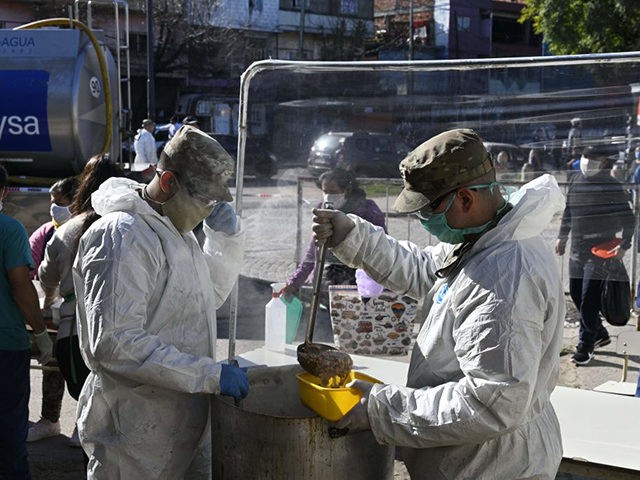An Argentine senator defended his province’s governor from accusations of human rights violations against suspected coronavirus patients Tuesday by declaring, “you have rights, but not in a pandemic.”
José Mayans represents the northern inland province of Formosa, one of the nation’s poorest and most remote. A member of the pan-ideological Justicialist Party, once run by Juan Perón, he is now the Senate leader of a leftist coalition in Congress known as the “Front for All.” Mayans was reportedly responding to a bombshell investigation by a Formosa councilwoman last week that revealed officials forcing individuals into isolation centers against their will, including many who had not tested positive for Chinese coronavirus and some who had tested negative. The councilwoman behind the investigation, Gabriela Neme, was arrested while filming what she called “inhuman conditions” in those centers.
Argentina has documented 1.9 million cases of Chinese coronavirus as of Wednesday and 47,253 deaths, one of the highest rates of infection in the world without taking into consideration that rogue states like China and Russia have likely significantly undercounted their case rates.
Formosa province has been run by the same Justicialist governor, Gildo Insfrán, since 1995.
In remarks Tuesday, Mayans described the criticisms of Formosa’s quarantine measures as “disrespectful” and part of a greater “political campaign” by the Argentine right to disparage the poor handling of the pandemic by the socialist government of President Alberto Fernández.
“You have rights, but not in a pandemic. It is clear in the penal code that you can’t go around contaminating people,” Mayans said. “This is preventative isolation, it’s ten or 14 days until they test negative. It is a protective measure.”
Mayans went on to dismiss claims of human rights abuses and did not address the accusations that, by indiscriminately forcing individuals who had not tested positive to the virus to live in poorly managed facilities with confirmed coronavirus patients, the government was actually helping propagate the disease.
“Of course not,” Mayans said in response to accusations of human rights abuses. “There may be isolated cases regarding the reactions of some people who deny the disease and others who do not want to be in those centers.”
Opposition politicians rapidly dismissed Mayans’ comments as “an aberration” and joined a growing chorus of Argentines demanding an investigation into what the government is doing in Formosa, according to the Argentine outlet Infobae. The news agency noted that many decried that Formosa police arrested Neme during her investigation, rather than aid her in responding to alleged abuses. Some have called for the United Nations High Commissioner for Human Rights, Michelle Bachelet, to intervene.
In response to the outrage, Mayans tried to backtrack on his remarks on Wednesday.
“At no time did I say that there were no rights,” he insisted, according to Argentine newspaper Clarín. “Infected people must take care of themselves of the State has to provide a way to take care of them.”
Mayans claimed that his words were “distorted” by opportunistic opposition politicians.
Insfrán, the governor of Formosa, also took to social media on Wednesday to call human rights concerns in his state a “false campaign” against the entire state and vehemently denied any human rights abuses.
The scandal erupted last week after Neme, the councilwoman, began publishing videos from within Formosa’s quarantine facilities allegedly showing “inhuman conditions,” including the lack of isolation of confirmed coronavirus patients from suspected patients. Some of those detained against their will were people traveling into Formosa from out of state who had a documented negative coronavirus test, which was reportedly not enough to keep them from being isolated with confirmed patients.
Neme claimed that the patients share a bathroom and no social distancing measures were in place in the isolation facilities. She also noted that the dire situation had begun harming the mental health of the captives, but the government had provided no access to mental health care. “They give no psychological assistance to these people, who are in a state of uncertainty, panic, anguish, and terrible depression,” Neme accused.
Neme added that “the friends of those in power” were the only people in Formosa allowed to isolate at home if they believed they were exposed to the virus. Recovering from coronavirus at home, even for those without symptoms, “is not permitted.”
Opposition members in Buenos Aires formally requested a human rights investigation into the situation on Tuesday. At press time, President Fernández had yet to weigh in. The president has largely left anti-coronavirus measures up to the provinces. Only one region, the capital of Buenos Aires, has mandated the use of sanitary masks in public. That ordinance has become controversial, prompting several physical attacks on police officers for reminding locals to wear masks. At least two incidents of civilians attacking police after being told to wear masks have been documented in the capital, one in August and one in January.

COMMENTS
Please let us know if you're having issues with commenting.